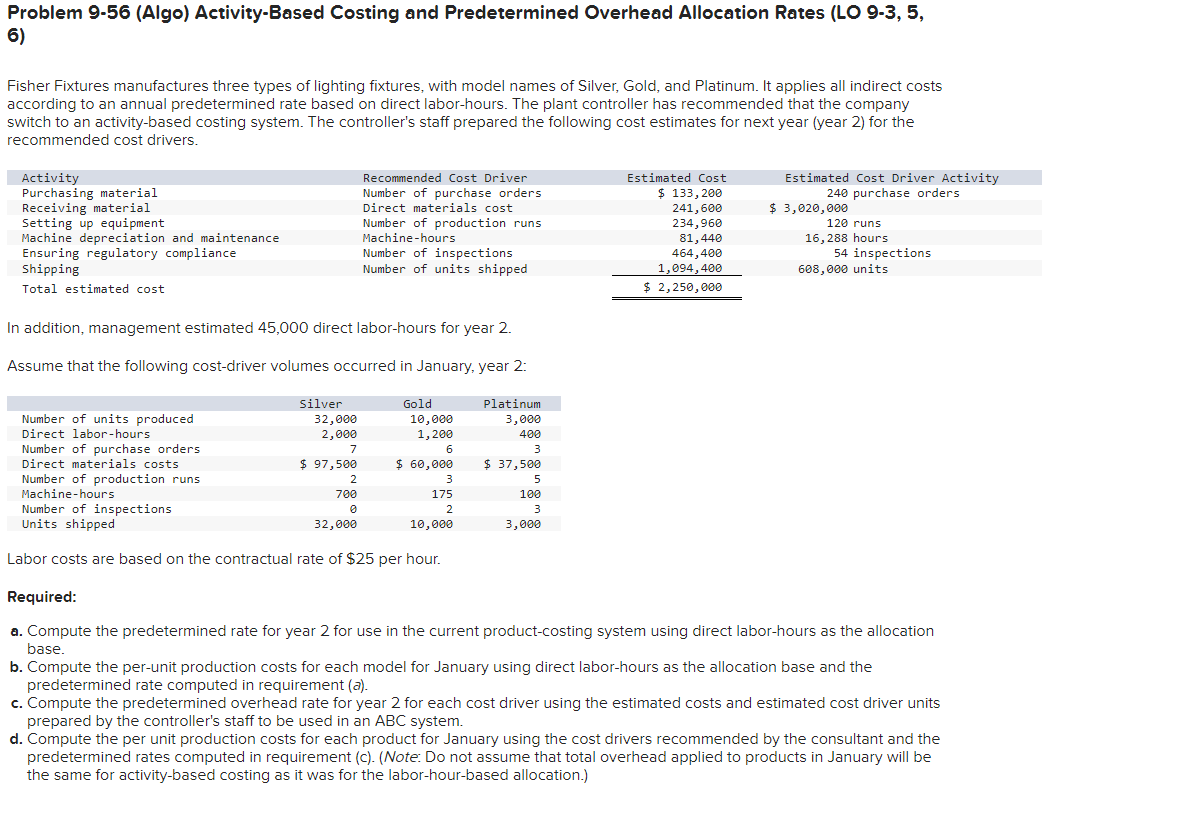
Problem 9-56 (Algo) Activity-Based Costing and Predetermined Overhead Allocation Rates (LO 9-3, 5 , 6) Fisher Fixtures manufactures three types of lighting fixtures, with model names of Silver, Gold, and Platinum. It applies all indirect costs according to an annual predetermined rate based on direct labor-hours. The plant controller has recommended that the company switch to an activity-based costing system. The controller's staff prepared the following cost estimates for next year (year 2) for the recommended cost drivers. In addition, management estimated 45,000 direct labor-hours for year 2 . Assume that the following cost-driver volumes occurred in January, year 2: Labor costs are based on the contractual rate of $25 per hour. Required: a. Compute the predetermined rate for year 2 for use in the current product-costing system using direct labor-hours as the allocation base, b. Compute the per-unit production costs for each model for January using direct labor-hours as the allocation base and the predetermined rate computed in requirement (a). c. Compute the predetermined overhead rate for year 2 for each cost driver using the estimated costs and estimated cost driver units prepared by the controller's staff to be used in an ABC system. d. Compute the per unit production costs for each product for January using the cost drivers recommended by the consultant and the predetermined rates computed in requirement (c). (Note: Do not assume that total overhead applied to products in January will be the same for activity-based costing as it was for the labor-hour-based allocation.) Problem 9-56 (Algo) Activity-Based Costing and Predetermined Overhead Allocation Rates (LO 9-3, 5 , 6) Fisher Fixtures manufactures three types of lighting fixtures, with model names of Silver, Gold, and Platinum. It applies all indirect costs according to an annual predetermined rate based on direct labor-hours. The plant controller has recommended that the company switch to an activity-based costing system. The controller's staff prepared the following cost estimates for next year (year 2) for the recommended cost drivers. In addition, management estimated 45,000 direct labor-hours for year 2 . Assume that the following cost-driver volumes occurred in January, year 2: Labor costs are based on the contractual rate of $25 per hour. Required: a. Compute the predetermined rate for year 2 for use in the current product-costing system using direct labor-hours as the allocation base, b. Compute the per-unit production costs for each model for January using direct labor-hours as the allocation base and the predetermined rate computed in requirement (a). c. Compute the predetermined overhead rate for year 2 for each cost driver using the estimated costs and estimated cost driver units prepared by the controller's staff to be used in an ABC system. d. Compute the per unit production costs for each product for January using the cost drivers recommended by the consultant and the predetermined rates computed in requirement (c). (Note: Do not assume that total overhead applied to products in January will be the same for activity-based costing as it was for the labor-hour-based allocation.)







